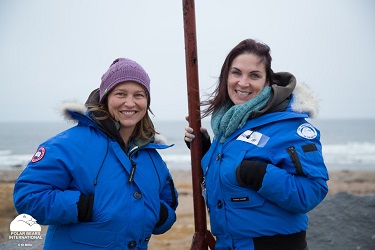
Toronto Zoo Keepers Attend Climate Alliance Workshop
In Churchill

Hollie Ross, Toronto Zoo Keeper and Heather Kalka, Toronto Zoo Keeper
Photo credit: Toronto Zoo
Toronto, ON November 02, 2015: The Toronto Zoo is a champion for Canada's majestic polar bears listed as vulnerable by the International Union for Conservation of Nature (IUCN), but are at risk of becoming endangered if global warming is not addressed. As a national leader in conservation and species survival, the Toronto Zoo has been actively involved in collaborative research projects to understand polar bear reproductive biology with other zoological associations and conservation institutions, including North American Species Survival Plan (SSP) and a close partnership with Polar Bears International (PBI).
PBI has an international network of Arctic Ambassador Centres that educate the public about climate change and provide leadership for carbon reduction within their communities. The Toronto Zoo is proud to be an active member of this significant network since 2007. As an Arctic Ambassador Centre, the Toronto Zoo is fortunate to have the opportunity to send staff to participate in PBI’s Climate Alliance in Churchill, Manitoba. Climate Alliance is a can-do working group focused on reducing greenhouse gas emissions and is designed for motivated individuals who want to advocate either personally, or through their organization, for sustainable lifestyles.
Toronto Zoo keepers, Heather Kalka and Hollie Ross, attended a Climate Alliance workshop from October 4 to October 10, 2015. Through the Alliance, this year’s attendees were trained and empowered to affect community change. The PBI Climate Alliance program includes a grounding in climate science, an understanding of the status of arctic sea ice, polar bears, the urgent need to act, and strategies to affect community change. Participants also had a chance to see these amazing animals in their natural environment that they are fighting to protect, including polar bears, belugas and even caribou.
Heather and Hollie are zoo keepers in the Americas region of the Zoo and work with a variety of species. They spend their days doing anything from overseeing endangered frog breeding to, most often, training a variety of husbandry behaviours that allow the Toronto Zoo to better care for their current polar bears. Some of these behaviours include routine physical exams, such as letting staff look inside their mouths, their undercarriage, or allowing voluntary injections for vaccines. These behaviours not only keep the bears physically healthy, but mentally stimulated and engaged.
Heather joined PBI in 2009 and has been inspired ever since. She now represents the Toronto Zoo as a facilitator at Climate Alliance educating her fellow zoo keepers on the importance of climate change and the roles their zoos and themselves play. “Being a zoo keeper serves as a strong reminder of not only the beauty in this world, but the responsibility we all have to preserve it,” says Kalka. Hollie has been a zoo keeper at the Toronto Zoo since 2005, and attended her first Climate Alliance workshop this year. “By attending the workshop I was able to grow my network of like-minded individuals, as well as, learn more about how I, and the Toronto Zoo, can make a difference and be more effective at spreading the word about climate change and its effects on polar bears,” states Ross.
Zoo biologists and researchers work closely with their Wildlife biologist counterparts in the field with valuable learning and studies that can be applied to polar bear conservation in the wild. The knowledge gained through polar bears in our care provide invaluable information that is shared internationally and is essential for the survival of this vulnerable species. This is very important as biologists estimate there are only approximately 20,000 to 25,000 polar bears in the wild with approximately 60% of those living in Canada.